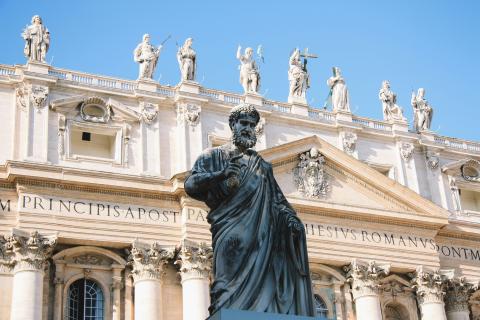
As winter officially turns into spring, much of the country is still enduring a colder year than usual. In the midst of the prolonged cold, the notes of a major season in the American “liturgical” calendar are upon us: the beginning of the professional baseball season. While one could write a poetic tribute to any of the various activities Americans come together and observe, baseball in particular holds a special place in the national imagination.
Baseball seems to check a box in every category of the traditional vision of how humanity spends its free time (especially in the tradition of Joseph Pieper). There is basic amusement and play, obviously contained within the playing of the game. But baseball seems to somehow go a step further, thus earning in the name of national pastime – which refers less to the playing of the game and more to the spectator.
One of the first references to baseball being America’s national pastime dates back to 1843 in the Alexandria Gazette:
“In connection with these remarks, we may say something of the general character of our national amusements. They are too much of the ‘whole hog,’ ‘break down’ order. If we would borrow the French Philosophy of amusement — their promenades, their music, their flowers, their fountains, — and their style of refreshments, so palatable yet so devoid of the grossness and intoxication of ours — we say if we would borrow these, and add to them, in place of French indifference (bordering on infidelity) our own sense of responsibility and of gratitude to the Giver of all Good — how much superior would be our enjoyment, how much more real our gratification — because so much freer from alloy and surfeit — on holy days and public celebrations! — We have been going the ‘whole hog’ long enough. It is time we were revolutionizing a little — it is time that we had seized upon those occasions which bring out the mass, for the improvement of their tastes and habits. National pastimes have a powerful influence over national character, and are, indeed, regarded by historians as among the strongest indices of the peculiarities as well as intelligence of a people.”
There is indeed a contemplative element to baseball. The gameplay is primarily strategic. The majority of time is spent preparing for the action. The need for quick reactions based on habituation in split-second activity allows for the sort of thinking and preparation that leads to greater things (even if to the uninitiated it seems like dead time). This sort of activity, combined with the green grass, the crack of the bat, the din of the crowd, and the smells of peanuts and hotdogs make the entire spectacle a thing to behold.
Further, true re-creative activity is relational. Baseball watching is highly conducive to real relationship with another. What begins in a game analysis leaves time for fraternal discussions. As opposed to other sports that have more in terms of explosive action and diversion, baseball requires a deeper orientation towards contemplation and relationality. It is not surprising that as our society loses its ability for silence and contemplation, it loses interest in baseball.
Finally, baseball is also a microcosm of life. The game is all interconnected. What happens in the third inning directly affects the eighth. And uniquely in the timelessness of baseball and human choice: it’s never over till it’s over: if one is willing, there is always time to achieve victory.
A recent and miraculous chain of events in Pittsburgh reveals the power of a single prayer – in fact, the power of a single Hail Mary. Read the astounding story here.
Prayers are requested for Pope Francis as he receives treatment for a respiratory infection. In a video message released this morning, Pope Francis stated his own prayer intentions for the month of April, inviting Christians around the world to join him in prayer for “a culture of nonviolence and peace”: “Living, speaking, and acting without violence is not surrendering, losing, or giving up anything but aspiring to everything.”
In the United Kingdom, the act of silent prayer itself is under attack: silently praying within 150 meters of an abortion facility in England and Wales could lead to your arrest.
In the United States, the seal of the confessional is again under legal attack, as legislators in Vermont, Washington, and Delaware seek to remove legal protections. Read the recent article from First Things to understand the importance of the seal of the confessional in Catholic life and why it would be damaging to remove legal protections.
A Catholic charity based in the United States has come to the aid of 20 Afghan girls who were injured in a deadly ISIS attack on their school, helping them to receive treatment and build new lives in Spain.
Finally, a philosopher explores self-defeating statements, unpacking how some claims we encounter on a daily basis contradict themselves at face value.


